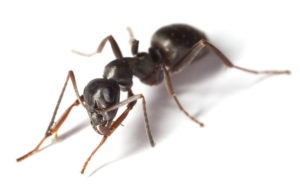Whether you encounter them in your home or in your garden, the black garden ant (Lasius Niger) can raise a lot of questions. With workers that may live 4 years and queens living 15 years or more, they are not going away quickly. In light of this, let’s explore the black garden ant – common questions.
Where Do They Live?
The black garden ants if found throughout the world and is split into two species. One lives in forested habitats and the other lives out in the open. They nest underground underneath rocks or roots though in some cases may utilize rotten wood.
Are They Poisonous?
The black garden ant is part of a subfamily of ants called Fornicinae. These ants have enlarged venom reservoirs. They don’t deliver their venom through a bite or a sting. They eject formic acid through an acidopore. It is important to note that the amount of venom that black garden ants carry is not enough to be a threat to humans.
About the best they could do is “ant mace” you. They would probably need to direct the formic acid directly into an existing cut to give an adequate burning sensation to a human.
Do They Bite?
They do have mandibles and are technically capable of biting, but not known to bite people. They are not aggressive creatures. They would have to feel threatened to bite and would be more likely to try and scurry off than engage in a bite-off with a gigantic human.
How Did They Get Their Name?
They prefer to eat sweet things such as nectar or the sweet secretions they can get from aphids by stroking (milking) them. Gardens are natural places for these ants to find desirable food in plenty.
What Do They Look Like?
They have 3 body segments with a single petiole segment separating the abdomen from the thorax. The workers (3-5mm) are a shiny black color and the queen (6-9mm) has slight brown abdominal stripes.
Why Are They Difficult To Control?
Black garden ants are advanced in the art of quarantining themselves. They build their colony to structurally block transmission of contagions. They do this through limiting connective nodes especially protecting essential parts of the colony such as the queen. Infected ants will spend more time outside of the colony foraging. When they go back to the hive, they limit their interactions with other ants. They were social distancing long before humans started practicing this in 2020.
If they suspect something is wrong, they are likely to isolate themselves and minimize the spread of insecticides throughout the colony.
Do They Really Babysit Butterflies?
Yes, the silver-studded blue butterfly drops her eggs off near nests of the black garden ant. The ants will protect the eggs and the larva from attacks by spiders, wasps, and other predatory insects. They aren’t altruistic by any stretch – just like any babysitter, they require adequate payment. The larva delivers this through an amino acid-rich saccharine secretion from a gland on the larva’s back.
Getting Rid Of Them
If the black garden ant has plenty to eat, they can be difficult to get rid of. If you are needing help with ant identification or control, reach out to the ant experts at roveboston.wpengine.com. A free consultation will provide you with the information you need to move forward in the formic war.

